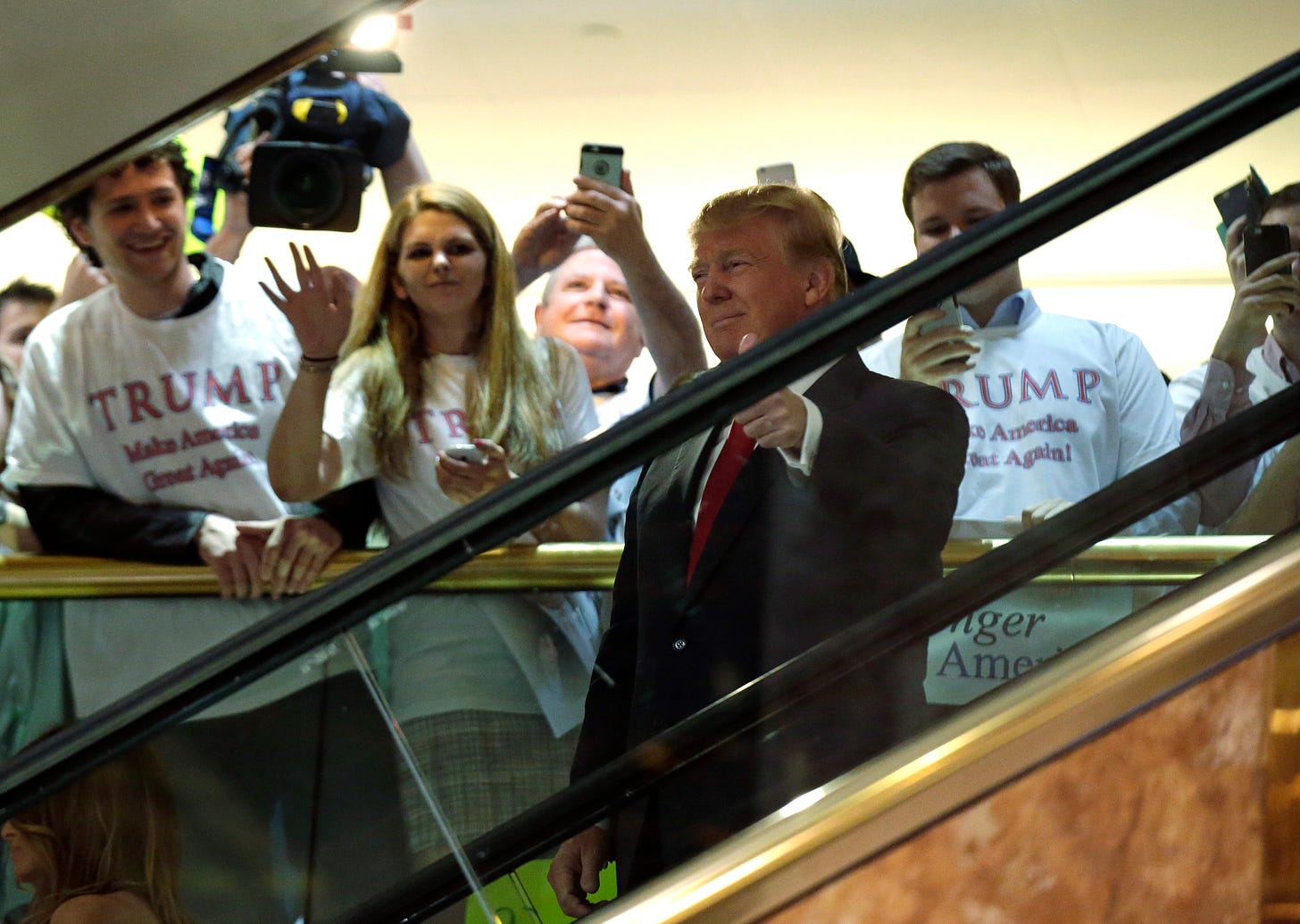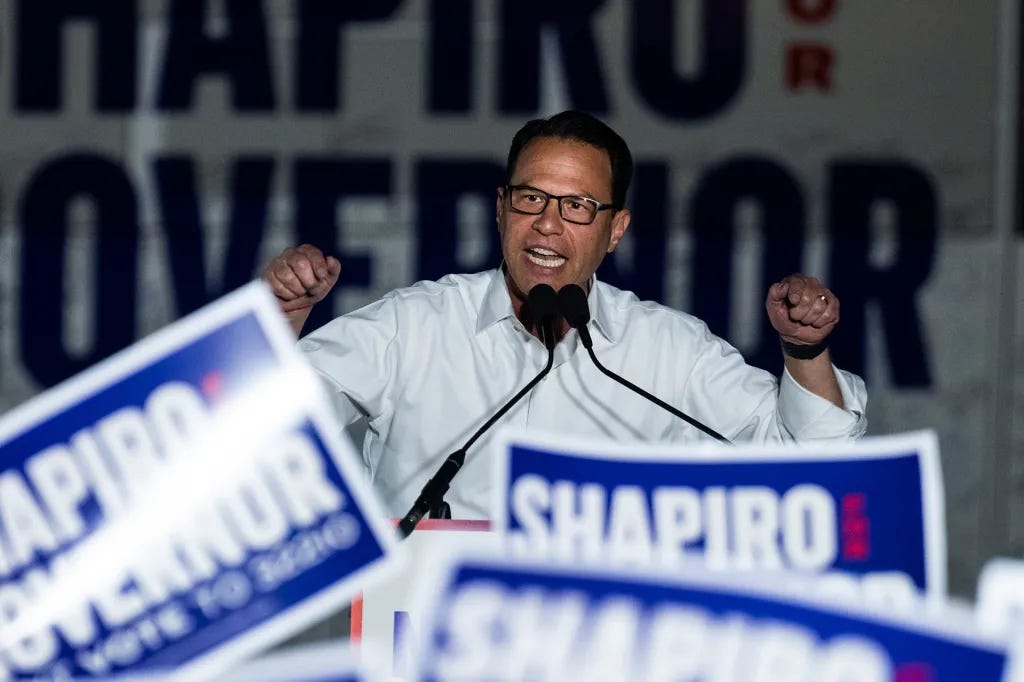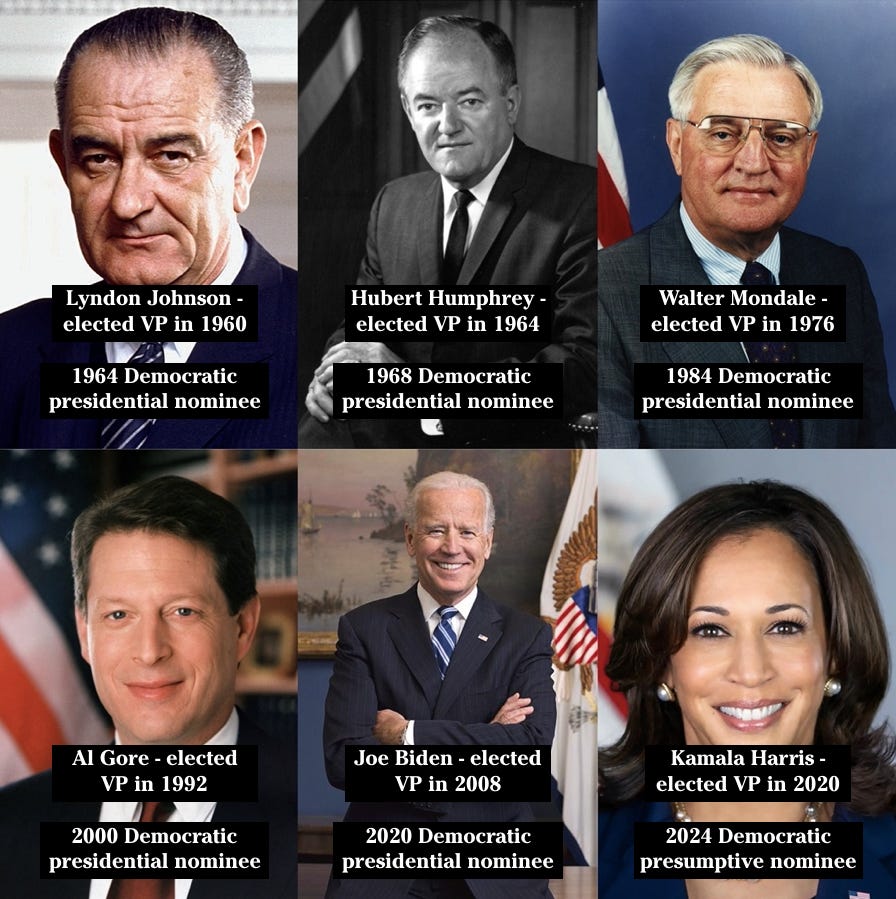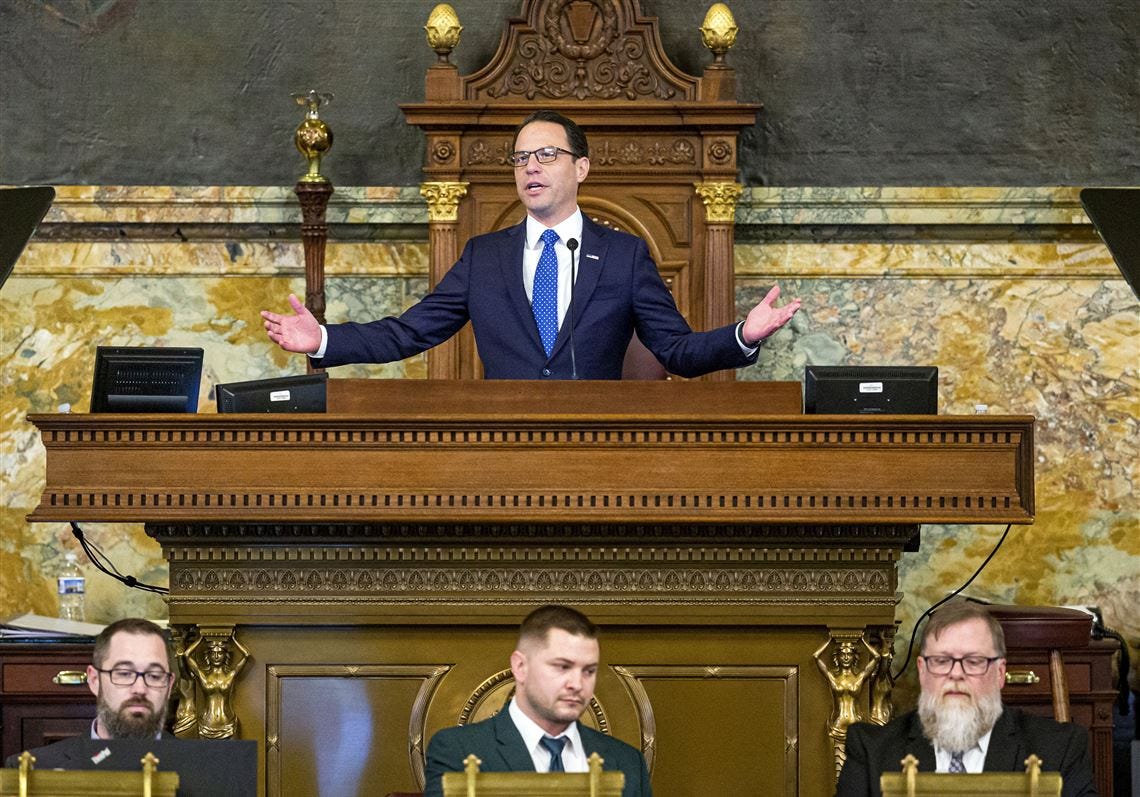The Josh Shapiro Problem
As the Democratic Party veepstakes have ramped up over the past few days since President Biden’s exit from the 2024 race and Vice President Harris’ stunning consolidation of delegate support - one of the most consistent names in the mix has been Pennsylvania Governor Josh Shapiro.
Despite the obvious benefit of picking a governor from a key swing state, there has been much pushback from the left side of the party. Part of it has to do with Shapiro’s Jewish faith and the possibility of enflaming tensions over the Israel-Hamas war. But let’s be honest here - if there’s any voter who would drop their vote for a Democrat for President because the person at the bottom of the ticket happened to be Jewish - was that person really on our side in the first place?
I am particularly strained to find any explanation for why Governor Shapiro is considered the more unlikable vice presidential contender on the issue of Israel-Gaza other than antisemitism. Yes, he was partially instrumental in forcing out the President of Penn University Liz Magill for her particularly terrible answers to a congressional committee about campus antisemitism. But it’s not like the other white men in the conversation like Arizona senator Mark Kelly, North Carolina governor Roy Cooper, or Kentucky governor Andy BeShear have any particular daylight with Shapiro on this. For example, Kelly has consistently voted to send billions in both defensive and offensive military support to Israel. Cooper signed into law this year a Republican-sponsored bill to set state-defined standards for antisemitism to be used in holding people responsible for hate-crime-related elevated criminal sentences. Keep in mind that Shapiro is on the record referring to Israeli prime minister Benjamin Netanyahu as “a dangerous and destructive force.” So why is it that both the rabidly Israel-skeptic sections of the left and parts of the media consistently single out Shapiro as the guy (“Genocide Josh”) who would enflame tensions in the Democratic Party over the Middle East? Oh, right, because he happens to be Jewish. It’s really that simple. I wouldn’t have problem if the criticism was equal - holding politicians to account on issues you firmly believe in is a right and a duty - but that’s not what’s happening here.
However, my concern with Josh Shapiro possibly claiming the bottom of the Democratic ticket has to do with some of his policy positions, especially on education:
After being sworn in as Governor in January of last year with a newly minted Democratic majority in the Pennsylvania House (but still a GOP majority in the Senate), Shapiro sponsored a Republican-written bill to create new taxpayer-funded private school voucher programs. While all kinds of privatization of the public school program tend to decimate the education system, vouchers are a particularly terrible system, because they are so hard for government to control and regulate. With a program like charter schools, the sovereign entity, usually the state, still has to authorize the creation of the institution, sort of like a government contractor would get approval to build a highway or sell food to the military. Regulation is still possible with charters, because the government still holds the power to create the school. Vouchers, on the other hand, are just an act of outsourcing, where the government pays parents a certain amount of money to spend on a school of their choice, and that can often include religious institutions. And the biggest problem with voucher programs is that because the government doesn’t control the creation of the schools, rural communities and poorer areas get just about none of the benefits because the private entities don’t want to build schools in those areas. Vouchers are a total scam, and even though Governor Shapiro ultimately vetoed one of the proposals after facing backbreaking Democratic pressure, he should be viewed with great skepticism. Many pro-public-school advocates suspect that his position is solely based on tremendous amounts of campaign donations from billionaires Joel Greenberg, Jeff Yass, and Arthur Dantchik.
“But wait,” you might ask. “Shapiro will just be Vice President…” Well - since the end of World War II, all but one (the exception being Alben Barkeley) Democratic vice president has, at some point in time after reaching that office, won the Democratic nomination for President.
Obviously, economic and worldwide events are impossible to predict to perfection. It’s absolutely possible that a President Harris could encounter both an unforeseen economic collapse and a foreign policy debacle that will doom her re-election chances and along with it the hopes for a Vice President Shapiro to ever make it to the Oval Office. But most of the time, it’s not a bad bet to predict the re-election of the American president, especially a Democrat. No Democratic president since the New Deal has ever gone into an election year, whether running for re-election or on his way out of office, with BOTH a recession and slower year-over-year economic growth than the preceding eight years. Only ONE Democratic president since that time, Jimmy Carter, has ever entered an election year presiding over an economic recession. And only one Democratic president since the parties switched at the turn of the 20th century, Jimmy Carter, has ever lost a bid for re-election.
Therefore, based on the data, it should be our basic assumption that if Harris defeats Trump this November, she will be a two-term president.
So that brings us to the 2032 Democratic primary. Yes, I can already hear the calls of “Too early! Too early!” But just remember that we are closer in time to the 2032 election than we are from this picture:

So yes, it matters. And yes, we should be thinking about it today rather than waiting until the day arrives upon us. Any person that Kamala Harris chooses as her Vice President who is under the age of 65 will instantly become the frontrunner for the Democratic nomination in 2032. And depending on things like the condition of the economy, our foreign affairs, President Harris’ legislative accomplishments - and most importantly how quickly that person can clear the rest of the field, secure a majority of delegates, and unite the party at the convention - they have at least a 50-50 proposition of being sworn in as the 48th president of the United States.
If Josh Shapiro were the very popular 70-year-old governor of Pennsylvania who happened to support school vouchers, I would not care about putting him at the bottom of the ticket. Ultimately, President Harris will be the person appointing the Secretary of Education, issuing executive orders to the DoE, and have veto power over legislation passed by the Congress. And I find it highly unlikely that a Democratic primary electorate having gone without a contested primary for twelve years will be itching to nominate someone over the age of 75.
But Josh Shapiro is 51.
If you’re one of my regular readers, you’ll know that I usually come to a clear position on a certain political subject…I like to opine! But for this one, I honestly don’t know the right answer. I almost feel like my opinion changes on a Harris-Shapiro ticket every 15 minutes, because it is such a tough call.
The math behind beating Donald Trump - which almost certainly requires Kamala Harris to win the state of Pennsylvania - screams in our face for Shapiro to be the vice presidential nominee. As I pointed out last week, if Trump holds onto his 235 electoral votes from the states he won in 2020, and simply adds the electoral votes of Pennsylvania (19) and Georgia (16), he wins the election outright. But is that worth risking the future of public education in America by putting a pro-voucher Democrat in the driver’s seat for the presidential nomination eight years from now? Or could the institutional base of the Democratic Party keep a President Shapiro’s positions on education in check?
Is Josh Shapiro’s 15-point victory over January 6th rioter Doug Mastriano really impressive enough to qualify him as the most electable Democrat of the modern era - or are liberals falling for the same fallacy that allowed Republicans to believe Ron DeSantis’ 20-point victory was somehow a sign he could go further than his embarrassing finish in Iowa? Why is it that the most ardent supporters of Josh Shapiro leading the 2024 Democratic ticket from the Editorial page of the New York Times and other media outlets are all Republicans? In an uncertain foreign policy landscape that will now be losing its most experienced foreign policy President since the 19th century and likely be replaced with a very smart and capable woman, but who has spent the majority of her career in domestic policy, should her most trusted advisor be a man who has not even finished half of one term as governor?
I leave those questions for you to ponder. But soon we will know what Vice President Harris believes is her best choice for a running mate. The Democratic National Convention is in just 21 days.




